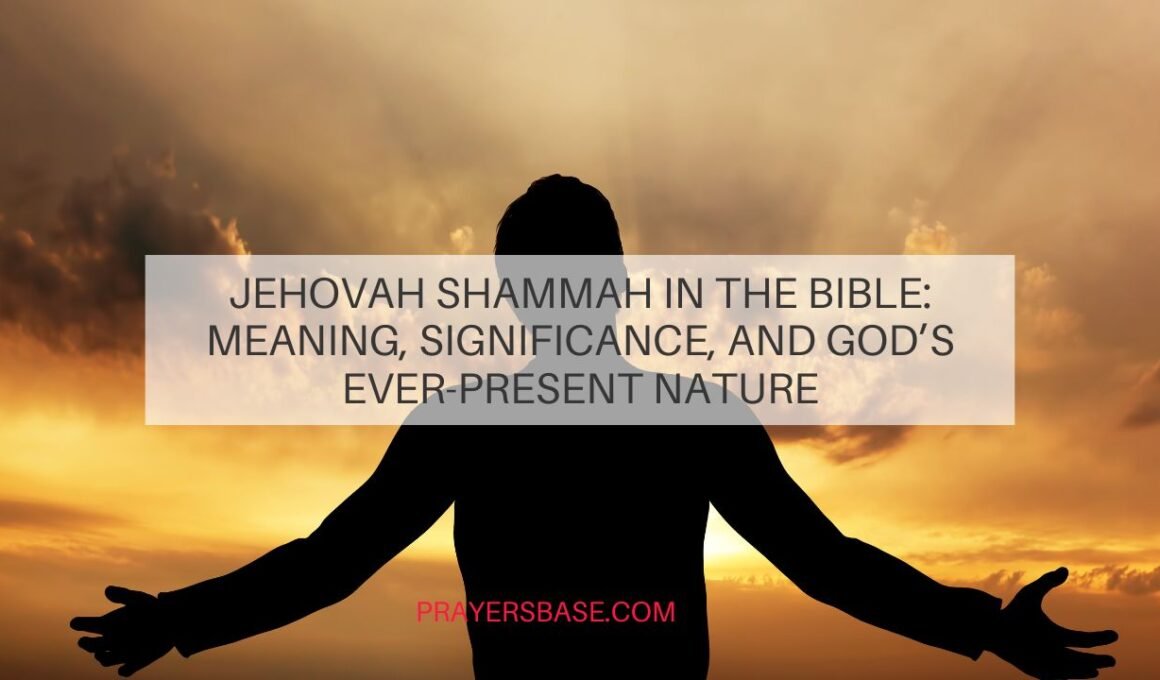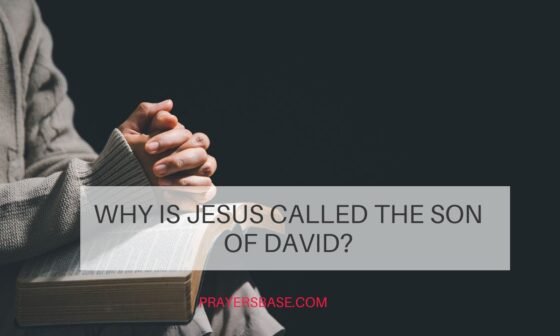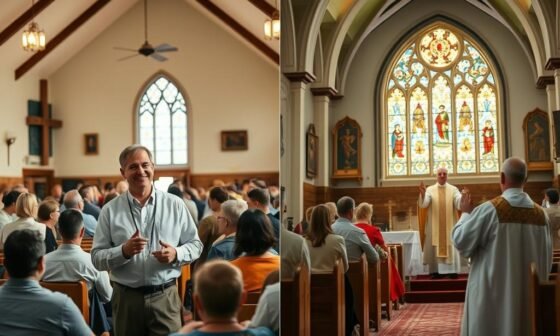One of the most powerful names of God revealed in the Bible is Jehovah Shammah, which means “The Lord Is There.” This name reassures believers of God’s constant presence, offering comfort, guidance, and security in every season of life.
The name Jehovah Shammah first appears in Ezekiel 48:35, where the prophet Ezekiel describes the future city of Jerusalem, stating that its name will be:
📖 “And the name of the city from that time on shall be, ‘The Lord is there.’” (Ezekiel 48:35, ESV)
This declaration reveals a promise of restoration and divine presence, pointing to a time when God’s people will experience His presence fully and eternally.
What Does “Jehovah Shammah” Mean?
The Hebrew phrase Jehovah Shammah (יְהוָה שָׁמָּה) translates to “The Lord is there” or “The Lord is present.” This name emphasizes the unfailing presence of God, assuring His people that He will never abandon them.
✔️ Jehovah (יְהוָה) – The personal name of God, often translated as “The LORD”, signifying His eternal existence and faithfulness.
✔️ Shammah (שָׁמָּה) – Meaning “there”, referring to God’s nearness and presence.
This name was given in a prophetic vision to show that God’s presence would one day fully return to His people, signifying spiritual renewal, restoration, and divine dwelling.
Where Is Jehovah Shammah Mentioned in the Bible?
Jehovah Shammah appears explicitly in Ezekiel 48:35, but the theme of God’s presence is woven throughout the entire Bible. From the Garden of Eden to the New Jerusalem, Scripture reveals God’s continuous desire to dwell among His people.
📖 Exodus 33:14 – “My Presence will go with you, and I will give you rest.” 📖 Psalm 139:7-10 – “Where can I go from Your Spirit? Where can I flee from Your presence?” 📖 Matthew 28:20 – “And surely I am with you always, to the very end of the age.”
Each of these passages echoes the truth of Jehovah Shammah—that God is always with His people.
Why Is This Name of God Important for Believers Today?
Understanding Jehovah Shammah is crucial because it reminds us that:
✔️ We Are Never Alone – Even in moments of hardship, God is present, guiding and comforting us. ✔️ God Dwells Within Us – Through the Holy Spirit, believers experience Jehovah Shammah personally (1 Corinthians 6:19). ✔️ God’s Presence Brings Peace – When we recognize that “The Lord is there”, we can face life’s challenges with confidence. ✔️ Jesus Fulfills This Promise – Through Christ’s sacrifice, we are given full access to God’s presence, now and for eternity (Hebrews 10:19-22).
The Biblical Origin of Jehovah Shammah
Jehovah Shammah in Ezekiel 48:35 – “The Lord Is There”
The phrase Jehovah Shammah is found in the final chapter of Ezekiel, a book written during a time of great devastation for Israel. The Babylonian exile had left Jerusalem in ruins, the Temple destroyed, and the people scattered. In the midst of this despair, God gave Ezekiel a vision of a restored Jerusalem, where His presence would dwell permanently.
📖 Ezekiel 48:35 – “And the name of the city from that time on shall be, ‘The Lord is there.’”
This prophecy pointed to God’s promise to restore His people, both physically and spiritually. The name Jehovah Shammah declared that God would never abandon His people, even in their lowest moments.
Context: God’s Promise of Restoration to Israel
At the time of Ezekiel’s prophecy, the Israelites were in exile in Babylon. They had lost their land, their temple, and their sense of identity. Yet, in the darkest moments, God gave them a promise of hope.
✔️ God’s Presence Had Departed – Earlier in Ezekiel (Ezekiel 10), the prophet had witnessed God’s glory leaving the temple due to Israel’s sin. This was a devastating sign of separation. ✔️ A Future of Restoration – In the latter chapters of Ezekiel, God promised to return to His people, bringing healing, renewal, and divine presence. ✔️ A City Marked by God’s Presence – Unlike the earthly Jerusalem that was destroyed, the new city in Ezekiel’s vision would be one where God would dwell forever.
This prophecy was not just about a physical city but also pointed to a spiritual reality—the ultimate fulfillment of God’s presence among His people through Jesus Christ and the Holy Spirit.
How This Name Reflects God’s Presence in the Old Testament
Throughout the Old Testament, God repeatedly demonstrated His desire to dwell among His people:
📖 Exodus 40:34-38 – God’s glory filled the Tabernacle, leading the Israelites through the wilderness.
📖 1 Kings 8:10-11 – The presence of God descended in the Temple built by Solomon.
📖 Isaiah 7:14 – The prophecy of Immanuel, meaning “God with us,” pointing to Jesus.
These passages reveal that Jehovah Shammah was not just a future hope but had always been God’s desire—to be near His people.
The Significance of Jehovah Shammah in the Bible

God’s Presence in the Tabernacle and Temple
Throughout biblical history, God’s presence was manifested in the Tabernacle and Temple. These sacred places symbolized His nearness and dwelling among His people:
📖 Exodus 40:34-35 – “Then the cloud covered the Tent of Meeting, and the glory of the Lord filled the tabernacle.”
📖 1 Kings 8:10-11 – “When the priests withdrew from the Holy Place, the cloud filled the temple of the Lord, and the priests could not perform their service because of the cloud, for the glory of the Lord filled His temple.”
These passages show that God’s physical presence was evident among the Israelites. However, this presence was often conditional—it would depart when the people turned away from Him.
Jehovah Shammah as a Prophetic Name for the New Jerusalem
The name Jehovah Shammah not only referred to ancient Jerusalem’s restoration but also pointed to a future, eternal city:
📖 Revelation 21:3 – “Look! God’s dwelling place is now among the people, and He will dwell with them. They will be His people, and God Himself will be with them and be their God.”
This verse describes the New Jerusalem, where God will permanently dwell with His people. The prophecy of Jehovah Shammah finds its ultimate fulfillment in this eternal reality.
How Jesus Fulfills the Promise of Jehovah Shammah
Jesus is the ultimate fulfillment of Jehovah Shammah. Through Him, God’s presence is now accessible to all who believe:
📖 John 1:14 – “The Word became flesh and made His dwelling among us.” 📖 Matthew 1:23 – “They will call Him Immanuel (which means ‘God with us’).”
Through His life, death, and resurrection, Jesus bridged the gap between humanity and God. Now, believers can experience His presence daily through the Holy Spirit (John 14:16-17).
Related Names of God That Reflect His Presence
While Jehovah Shammah emphasizes God’s presence, several other names of God reveal His nature in powerful ways:
Jehovah Jireh – The Lord Provides
📖 Genesis 22:14 – “So Abraham called that place ‘The LORD Will Provide.’ And to this day it is said, ‘On the mountain of the LORD it will be provided.’”
This name reminds us that God is our ultimate provider, meeting our physical, emotional, and spiritual needs.
Jehovah Rapha – The Lord Heals
📖 Exodus 15:26 – “For I am the LORD, who heals you.”
God’s presence brings healing—whether it is physical restoration, emotional peace, or spiritual renewal.
Jehovah Nissi – The Lord Our Banner
📖 Exodus 17:15 – “Moses built an altar and called it ‘The LORD is my Banner.’”
This name signifies God’s protection and victory, showing that His presence leads us to triumph over challenges.
Jehovah Shalom – The Lord Our Peace
📖 Judges 6:24 – “So Gideon built an altar to the LORD there and called it ‘The LORD is Peace.’”
God’s presence brings peace amid chaos, assuring us that we can trust Him in every situation.
Biblical Examples of God’s Ever-Present Nature
Throughout Scripture, God reassures His people of His constant presence:
📖 Exodus 13:21-22 – God’s Presence with Moses and the Israelites: “By day the LORD went ahead of them in a pillar of cloud to guide them… and by night in a pillar of fire.”
📖 Joshua 1:9 – “Have I not commanded you? Be strong and courageous. Do not be afraid; do not be discouraged, for the LORD your God will be with you wherever you go.”
📖 Matthew 28:20 – “And surely I am with you always, to the very end of the age.”
These passages confirm that God has always been present with His people—guiding, protecting, and sustaining them.
Conclusion
The name Jehovah Shammah is a powerful reminder that God’s presence is constant and unchanging. No matter what we face, we can trust that:
✔️ God is near in times of trouble.
✔️ His presence brings peace, guidance, and strength.
✔️ Through Jesus, we experience Jehovah Shammah daily.
📖 Romans 8:38-39 – “Nothing can separate us from the love of God that is in Christ Jesus our Lord.”
May we walk in the assurance that The Lord is There, now and forever. Amen.
FAQs About Jehovah Shammah
1. Is Jehovah Shammah another name for God?
Yes, Jehovah Shammah is one of the many names of God found in the Bible, specifically in Ezekiel 48:35, meaning “The Lord Is There.”
2. What is the difference between Jehovah Shammah and Jehovah Jireh?
✔️ Jehovah Shammah emphasizes God’s presence.
✔️ Jehovah Jireh focuses on God’s provision.
3. How can I experience Jehovah Shammah in my daily life?
✔️ Spend time in prayer and worship.
✔️ Meditate on God’s Word.
✔️ Trust in God’s guidance and presence, even in challenges.
4. What does Jehovah Shammah teach us about God’s nature?
It reminds us that God is always with us, even when we don’t feel His presence.
5. How is Jehovah Shammah connected to the Holy Spirit?
Through Jesus Christ, believers now have the Holy Spirit dwelling in them, making Jehovah Shammah a reality in our daily lives (John 14:16-17).







